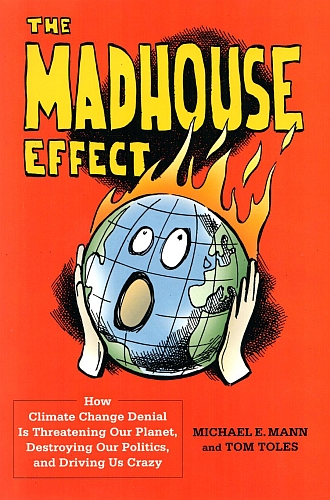

| THE MADHOUSE EFFECT How Climate Change Denial is Threatening our Planet, Dstroying our Politics, and Driving us Crazy Michael E. Mann Tom Toles New York: Columbia University Press, September 2016 |
Rating: 5.0 High |
|||
| ISBN-13 978-0-231-17786-3 | ||||
| ISBN-10 0-231-17786-0 | 186pp. | HC/GSI | $24.95 | |
If you've been following the disputacious development of climate science over the past decade or so, you won't learn anything new from this book. It will, however, affirm the fact that the Denialists1 have not yet won.2
It first explains how science works (hint: not like the Denialists claim it works.) Then it gives an overview of the climate science basics.
Chapter 3 asks, rhetorically, "Why should I give a damn?" The reason you should give a damn can be expressed in two words: food security. Climate change will make growing crops harder in many regions where they now grow well, bringing hunger and subsequent migrations as the planet's expanding populations try to stay alive. It is the most cogent chapter in the book.
Chapters 4 and 5 name the most influential Denialists in the U.S. and describe their activities. A good number of them have been sowing confusion about crisis after crisis, which tends to suggest that — far from being the public-spirited truth-tellers they pretend to be — they have ulterior motives. See the sidebar.
The authors then turn to geoengineering, telling in concise terms the pitfalls of the major techniques that have been proposed as emergency measures in case conditions on Earth get really bad. Let me summarize: reducing greenhouse gas emissions is both cheaper and less risky than any of these techniques. The table provides a bit more detail.
Mann and Toles name the great majority of the climate-change denialists in chapters 5 & 6. These individuals, almost universally male,3 are found all over the world. However, they flourish in certain industrialized countries, and among these countries the United States is arguably foremost. Their number includes the leaders of some (but not all) fossil-fuel and energy companies, as well as most of the Republicans in Congress. As I read these chapters, one thing I should have noticed long ago occurred to me. That is the persistence of names.
If there were a huge hoax to fob off the false notion of climate change on the public, we should expect this hoax to be exposed by people we hadn't heard of. Instead, we find this hoax claim raised by the same names that earlier decried the concerns over smoking and cancer, acid rain, and the ozone hole. Had those previous concerns proven to be unwarranted, such persistence might be justified. However, they were not unwarranted. The sensible conclusion, then, is that an ulterior motive drives these persistent warriors. And that is the truth.
As for money, the famous Upton Sinclair quip "It is difficult to get a man to understand something, when his salary depends on his not understanding it" is once again relevant. – Page 75 |
I would modify Sinclair's words only slightly, changing "salary" to "salary or ideology." Neither money nor ideology can trump physical reality. So I wonder what these bad boys will do when the reality of climate change comes for them.
| Mirrors in space |
|
| Sulfate aerosols |
|
| Iron fertilization of oceans |
|
| Sucking CO2 out of atmosphere |
|
Suffice it to say that reducing CO2 emissions by phasing over to renewable energy is far less expensive than any of these methods — and we know it will work. A pioneer of our electrical distribution grid put it this way a long time ago:
"I'd put my money on the sun and solar energy. What a source of power! I hope we don't have to wait until oil and coal run out before we tackle that." – Thomas Alva Edison, page 147 |
Finally, a status report briefly describes what progress has been made so far, and lays out things we can do to keep that momentum building.
As I began the book, I felt the reading level of the text should have been lower, considering the audience it needs to reach. But if that is a problem, it is only in places. The most of the book seemed fine, and I would especially recommend chapters 3, 7 & 8. There are very few errors. The cartoons by Tom Toles greatly enhance the impact, and the use of the song at the beginning of Chapter 7 is inspired. Endnotes and an index are provided. This is not the book to look for if you want a thorough treatment of climate science or energy policy options. But you will not find a better discussion of the essentials of the problem that faces us.

 To contact Chris Winter, send email to this address.
To contact Chris Winter, send email to this address.